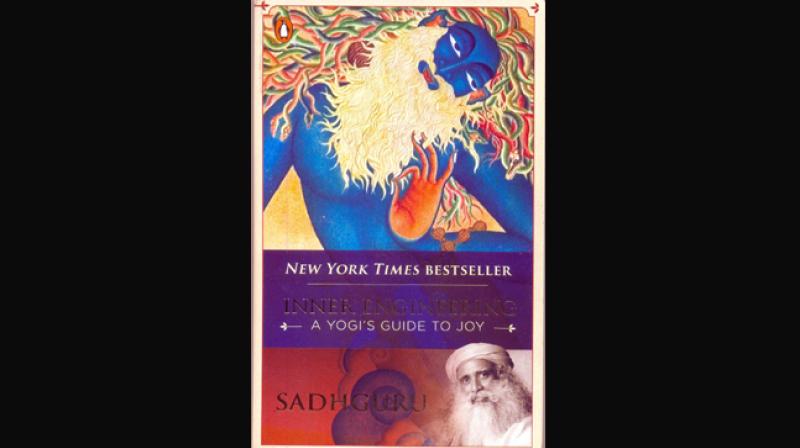Book review: Demystifying yoga, redefining Ghar Vaapsi'

Chennai: His flowing beard may not be as tough as the proverbial 'Plato's Beard'-, a sobriquet that stuck among some of the most brilliant mathematical logicians in the pre-Truth era to reflect on how 'non-being' may be tangible!
But Indian spiritual leader and Yoga guru, Sadhguru Jaggi Vasudev's latest book offering - 'Inner Engineering - A Yogi's Guide to Joy' - coming on top of him having led the Yoga session on the Second International Yoga Day on June 21, 2016 at the UN headquarters in New York, with a wonderful interaction with world envoys on the theme 'Yoga for Sustainable Development Goals'- symbolises a peak rose by itself. India's soft power in the West has been legendary in a way since Swami Vivekananda's famous Chicago address, over a century and score earlier.
It comes as no Ozymandias-like vanity from a self-trumpeting resurgent 'Bharat', extolling the virtues of bone-bending or how many push-ups one can do in a minute to make another Guinness world record. Sadhguru's remarkably lucid 262-pages exposition is well annotated with compassion, care, wit and wisdom to help a suffering humanity, by showing what could possibly be a paradoxically new way of looking at old-fashioned thinking, to love and be together, to liberate human thought from narrow confines of purportedly puritanical, militaristic-nationalism.
"There is a way out. And the way out is In. It is only by turning inward that we can truly create a world of love, light and laughter. This book could be a doorway to that world," sums up Sadhguru, and adds with an existential emphasis, "Let us make it happen." The book lives up to that spirit of free enquiry, no apologia for another ideology or theology of 'Yoga'. In fact, it even de-ontologizes 'Yoga', saying somewhat like the Buddha, that people don't need to worry about God or metaphysics, to redress plain suffering.
Sadhguru's existential kaleidoscope draws its elements from the incredible mystical experience- that oceanic feeling of being one with everything, the Internet of spiritual energy as it were. He narrates this experience he had as a much younger, a jeans-clad motorbike freak, driving up the Chamundi Hill near his hometown Mysuru. But for him, it was also a transformative moment, a new seeing of the will to live with positive zeal.
Though 'Yoga' down the ages has been understood as a 'unity' of the mind and the body and a cluster of 'Sadhanas' to realise that blissful state of 'chitta Vritti Nirodha'- what Jiddu Krishnamurthy used to say a fully aware mind that is free of all types of conditioning, 'karmic', social, cultural, etc.- Sadhguru also flags Jiddu's skepticisms about the mind-body dichotomy.
He looks more rather, given amazing scientific advances, a new "kind of chemistry" that is associated with peace, joy, ecstasy and human well-being. "The Yogic system has always known this. ...There is a technology (metaphorically put) for creating a chemical basis for a blissful existence. This is one dimension of what I call 'Inner Engineering'," he says. Sadhguru sees the value of such a transformation in directly addressing humanity's goals today, including mitigating effects of climate change.
Peppered with revealing anecdotes from different sources, in the first part Sadhguru analyses a range of key concepts like freedom, 'karma', responsibility, memory and so on, throwing fascinating insights. Responsibility "simply means your ability to respond," to a given human situation, weighing the pros and cons of options available to see how best one can act, while "reactivity is enslavement". The typical instances of the latter are blame-game and anger that for him is "fundamentally self-defeating".
There is a refreshing wind blowing in all this, for in re-reinterpreting Patanjali's 'Yoga Sutra' in layman's terms, Sadhguru's focus is on how any kind of boundary- whether of ideology, caste, creed, race or religion-, "only end up breeding fear, hatred and anger.
"No boundary, no burden. This is the turnaround in human consciousness that needs to take place." Once this takes place, he adds, "it is not that the cosmos begins to happen your way. Instead, what you are becomes cosmic. This is not transcendence; this is homecoming." This is a point to ponder for 'Ghar Vaapsi' proponents of the day.
In the second part of his book, Sadhguru devotes a lot of effort to different kinds of specific 'sadhanas', touching every aspect of life from food, the drinking habit, sex and love in human relationships, to not worsening pain with self-inflicted suffering, which the reader is free to think through for himself/herself.
Sadhguru neither wishes to take the moral high ground nor seeks to be prescriptive. His pragmatic approach in the second half is more resonant of the Tamil poet-saint Thiruvalluvar's insights, each one must think and feel through the virtues that are pro-life for an authentic grasp, as that alone often leads to 'transformative action' in individuals.
Some minor factual inaccuracies - like Aristotle being referred to as the 'father of modern logic'- that description is historically associated with a long line of mathematician-philosophers from Leibniz in 1847, George Boole, John Venn, Gottlob Frege, Early Russell and Whitehead to early Wittgenstein - would surely be set right in the next edition. But such things do not detract from the larger humanistic perspective of Sadhguru's inclusive spiritual vision that should be truly inspiring to today's youth.

